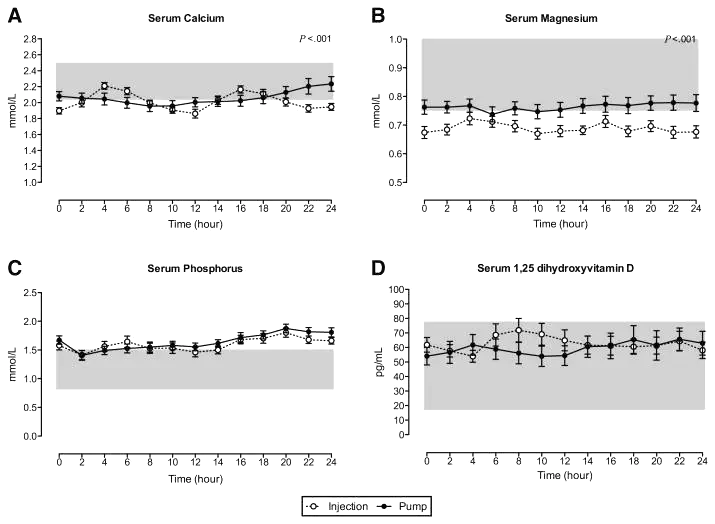Effects of pump versus twice-daily injection delivery of synthetic parathyroid hormone 1-34 in children with severe congenital hypoparathyroidism

Abstract
Objective To compare the response with synthetic human parathyroid hormone (PTH) 1-34 delivered by twice-daily injection vs insulin pump in children with severe congenital hypoparathyroidism due to calcium receptor mutation or autoimmune polyglandular syndrome type 1.
Study design Children and young adults aged 7-20 years with congenital hypoparathyroidism (N = 12) were randomized to receive PTH 1-34, delivered either by twice-daily subcutaneous injection or insulin pump for 13 weeks, followed by crossover to the opposite delivery method. The principal outcome measures were serum and urine calcium levels. Secondary outcomes included serum and urine magnesium and phosphate levels and bone turnover markers.
Results PTH 1-34 delivered via pump produced near normalization of mean serum calcium (2.02 ± 0.05 [pump] vs 1.88 ± 0.03 [injection] mmol/L, P < .05, normal 2.05-2.5 mmol/L), normalized mean urine calcium excretion (5.17 ± 1.10 [pump] vs 6.67 ± 0.76 mmol/24 h/1.73 m2, P = .3), and significantly reduced markers of bone turnover (P < .02). Serum and urine calcium and magnesium showed a biphasic pattern during twice-daily injection vs minimal fluctuation during pump delivery. The PTH 1-34 dosage was markedly reduced during pump delivery (0.32 ± 0.04 vs 0.85 ± 0.11 μg/kg/d, P < .001), and magnesium supplements were also reduced (P < .001).
Conclusion Compared with twice-daily delivery, pump delivery of PTH 1-34 provides more physiologic calcium homeostasis and bone turnover in children with severe congenital hypoparathyroidism.